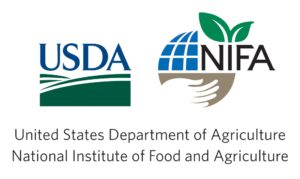The 2018 NWAL Tribal Summit: Event Recap and Photo Gallery
/1 Comment/in Events, News, Project update /by Kelsey FitzgeraldEvent recap: 2018 Youth Day at the Desert Research Institute
/1 Comment/in Events, News, Project update /by Kelsey FitzgeraldNWAL team member Karletta Chief honored with National TRIO award
/16 Comments/in News, Uncategorized /by Kelsey Fitzgerald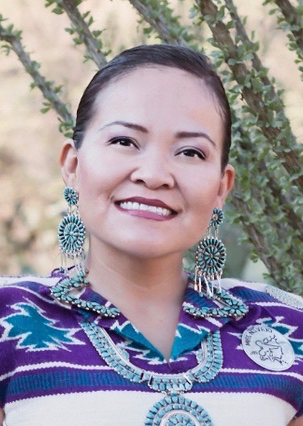
Dr. Karletta Chief
September 13, 2018. Native Waters on Arid Lands team member Karletta Chief, Ph.D., was honored today by the Council for Opportunity in Education as one of eight former students who were either low-income and/or first in their family to attend college, for remarkable contributions to her profession.
The Council for Opportunity in Education recognized the eight as 2018 National TRIO Achievers, so named for the federal TRIO college access and support programs that have been helping low-income, first-generation students and students with disabilities succeed in college against all odds for more than 50 years.
Karletta Chief is an alumna of Upward Bound at Southern Utah University. She is Diné and grew up on the Navajo reservation in Black Mesa, AZ, without electricity and running water, and speaking Diné as her first language. Although her family had little money, they gave her a strong cultural upbringing, strong family support,and encouraged her to do her best in school. Dr. Chief rode the bus 40 miles each way to the nearest public school, Page K-12 Schools, on the Navajo Nation border.
Congratulations to Karletta from the NWAL team!
Information about this award came from a COE press release.
Free webinar: Why conduct a climate change vulnerability assessment?
/1 Comment/in News, Project update, Webinars /by Kelsey FitzgeraldNWAL holds Youth Day event at Salish Kootenai College
/20 Comments/in Events, News /by Kelsey FitzgeraldOn a sunny Thursday morning in early May, twelve students from local high schools of the Confederated Salish and Kootenai Tribes of the Flathead Reservation in western Montana gathered in the fitness center cafeteria at Salish Kootenai College (SKC) for an event called “Youth Day.” The students were welcomed to the event by SKC president Dr. Sandra Boham.
“You really are going to be the next leaders in our communities,” Boham told them. “We need you. We need you here, and we need you in our future. I am always looking for who will be the next president of SKC, the next biology instructor, the next tribal attorney, the next principal for Polson School District. Who will be the next people run the dam and monitor the fish. It’s going to be you.”
Youth Day, a one-day event organized by researchers and educators from the Native Waters on Arid Lands (NWAL) project team, aimed to provide opportunities for meaningful dialogue and learning around the themes of climate change, adaptation, water and agriculture. The event agenda included an interactive “climate myths versus facts” session with NWAL education lead Meghan Collins; an outdoor dendrochronology lecture and tree-coring demo by Dr. Rick Everett, Professor of Forestry at SKC; a hands-on planting activity in a native plant restoration site on campus with SKC Extension Director Virgil Dupuis, and more.
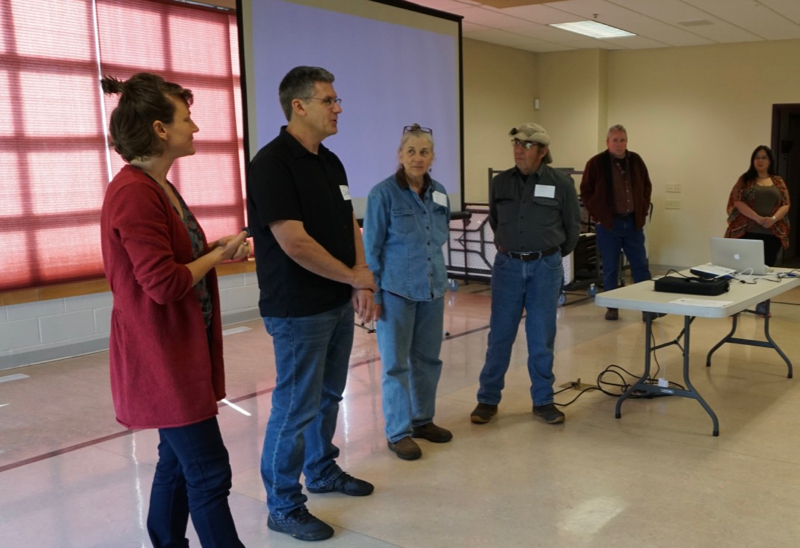
NWAL team members Meghan Collins, Derek Kauneckis, Anna Eichner, Scott Goode, Virgil Dupuis (SKC) and Mary Rose Morigeu (Confederated Salish and Kootenai Tribes) welcome participants to Youth Day, May 3, 2018.
“The discussion topics stemmed directly from the core themes of NWAL as a project – food, water and climate,” Collins explained. “We also worked really closely with SKC extension agent Virgil Dupuis to set up an agenda that we thought would be meaningful for the students and would resonate with their activities and future goals.”
The idea for this event was sparked via feedback from participants at NWAL’s Tribal Summit. The Tribal Summit is an annual event that gathers members from tribes across the western U.S. for two days of talks, workshops and two-way dialogue about issues on reservations and tribal lands related to climate change, agriculture, ranching, water resources, economics, and other topics of interest.
“Feedback from the Tribal Summit said, over and over again, that we cannot be talking about issues of climate without engaging our youth,” Collins said.
As such, Youth Day was designed not only as an opportunity for the NWAL team to teach the students, but to learn from them as well.
In the early afternoon, a group of five students from the Arlee EAGLES club – a student-run environmental advocacy club from Arlee High School located on the Flathead Reservation – stood before the group, teaching event attendees how to plant seeds of native Chokecherry and Twinberry in long, yellow, tube-shaped pots.
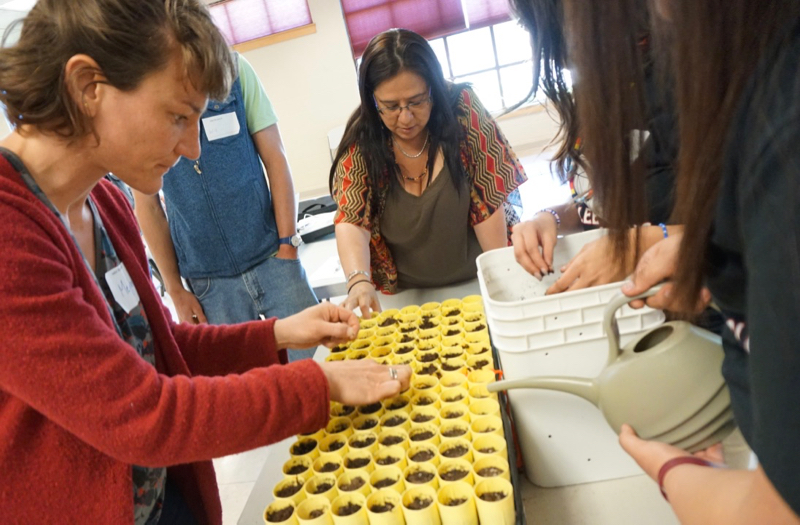
Meghan Collins (NWAL Education Lead) and Mary Rose Morigeau (Confederated Salish and Kootenai Tribes) learn native seed planting techniques from students from the Arlee EAGLES Club at NWAL Youth Day, Salish Kootenai College. May 3, 2018.
A shallow hole for the seed, a sprinkle of peat moss on top, and a little water, the Arlee students explained, as youth from other nearby schools of the Flathead Reservation, other tribal members, and members of the NWAL team circled around to try for themselves.
The Arlee students also presented an array of environmental projects that they had undertaken at their school, including a school-wide recycling program, a greenhouse, and an impressive effort to monitor emissions generated by their school’s coal-powered heating system. The students hope to use the emissions data to convince their local school board to change energy generation at their school to a cleaner and more sustainable system.
Youth Day concluded with a discussion and presentation by NWAL team member Scott Goode on a new approach for in-ground composting and sustainable gardening that also helps sequester carbon from the atmosphere, and a visit to the SKC vegetable garden plot.
“I really enjoyed learning about the composting system,” said Margaret Sansavere, a junior at Arlee High School and member of the Arlee EAGLES club. “I never thought about putting in-ground trenches of compost into a garden. It really inspired me to try to get my peers involved and changed my perspective on gardening.”
Youth Day at SKC was the second ‘Youth Day’ event hosted by the NWAL project; the first was held at the Desert Research Institute in Reno, Nev. in November 2017. Both events provided valuable opportunities for sharing knowledge and ideas across generations.
“This was a fantastic day of two-way dialogue,” Collins said. “The students really inspired our faculty and experts, and I hope that the students also came away with some new ideas for the projects that they are taking on at home.”
Additional NWAL Youth Day events are planned with Native students from Paiute and Shoshone Tribes in Nevada and Navajo Nation, Hopi and other Pueblo communities in Arizona and New Mexico.
NWAL research partnership to continue at Aaniiih Nakoda College
/19 Comments/in News, Project update /by Kelsey FitzgeraldAfter a successful 2017 season, the Native Waters on Arid Lands (NWAL) Faculty-Faculty Research Partnership with Aaniiih Nakoda College (ANC) in Montana has received new funding from the U.S. Department of Agriculture (USDA) for 2018. This funding will allow for the continuation of a project that was piloted in 2017, in which NWAL team member Richard Jasoni, Ph.D. partnered with ANC faculty member Brian Grebliunas, Ph.D. and ANC student intern Joel Doney to develop a research project in a community demonstration garden.
“We felt like the first season of this project was a really successful experience, with many benefits to all who were involved,” said Jasoni, who works for the Desert Research Institute (DRI) in Reno, Nev. “We are really excited to be able to continue this research partnership with the support from the USDA.”
NWAL’s Faculty-Faculty Research Partnership pairs faculty from research institutions such as DRI with faculty from Tribal Colleges and Universities (TCUs) to develop and build capacity for research at Tribal Colleges. Goals of the program are to help establish new scientific research programs at TCUs, and to help students gain hands-on research experience that they can use to help local communities, pursue undergraduate or graduate work, or pursue any number of careers in their field of study.

Student Joel Doney of Aaniiih Nakoda College researched irrigation application techniques during his 2017 summer internship with the NWAL research partnership program.
2017: A successful pilot season
The 2017 pilot project was designed to give Doney hands-on research experience by involving him in all aspects of the research study design, study setup, data collection, and data analysis. In the study, Jasoni, Grebliunas and Doney used the yellow onion (Allium cepa) as a test-species to investigate three research questions related to water use on arid lands: 1) Does reducing the amount of irrigation water application affect crop yield? 2) Does reducing the amount of irrigation water application affect soil moisture within the soil profile? And, 3) Does reducing the amount of irrigation water application affect soil nutrient content?
Their study results showed that reducing the amount of irrigation water resulted in smaller crop yields, lower levels of soil moisture, and had a significant effect on soil ammonia availability. The reduced irrigation treatment was not found to have a significant effect on dissolved phosphorous levels.
Plans for 2018
During the 2018 season, with new USDA support (grant 2017-38424-27076), the research team plans to continue to investigate the effects of water management on crop production. This year’s experiment will compare the effects of subsurface irrigation vs. aboveground sprinkler irrigation on soil moisture, soil nutrient levels and crop yield.
“We hope that this research experience is valuable to Doney in his career – and that our study results will provide insight into water management that will be useful to the ANC community and anyone growing crops in arid regions,” Jasoni said.
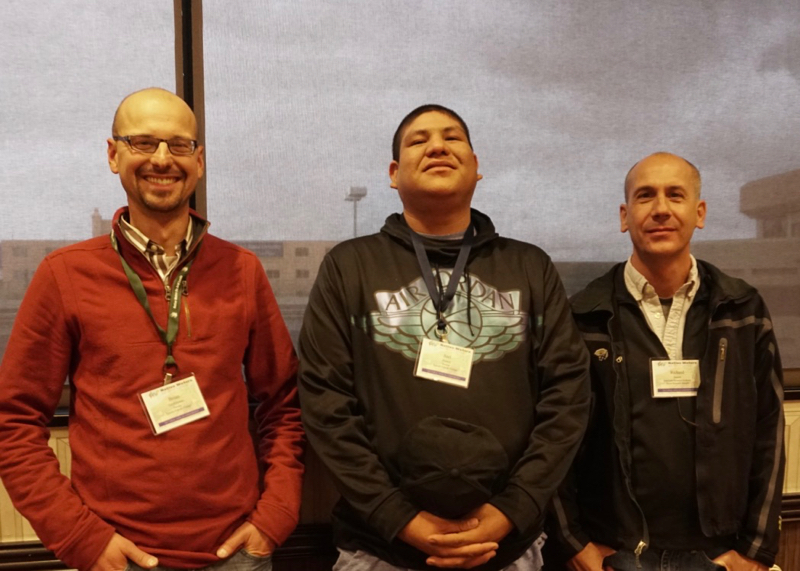
Brian Grebliunas, Joel Doney and Richard Jasoni at the 2017 NWAL Tribal Summit in Sparks, Nevada. November 2017.
About
The Native Waters on Arid Lands project seeks to enhance the climate resiliency of agriculture on American Indian lands of the Great Basin and Southwest by building the capacity within tribal communities to develop and implement reservation-wide plans, policies, and practices to support sustainable agriculture and water management.
Business Hours
Our support Hotline is available 24 Hours a day: (555) 343 456 7891
- Monday-Friday: 9am to 5pm
- Saturday: 10am to 2pm
- Sunday: Closed
Latest News
 Rainwater Harvesting on the Hualapai Reservation: New Research by Brianda Hernandez RosalesAugust 1, 2022 - 10:41 pm
Rainwater Harvesting on the Hualapai Reservation: New Research by Brianda Hernandez RosalesAugust 1, 2022 - 10:41 pm Maureen McCarthy/DRINew USDA Grant to Support Climate Resilience Planning in Indian CountryJanuary 13, 2022 - 5:59 pm
Maureen McCarthy/DRINew USDA Grant to Support Climate Resilience Planning in Indian CountryJanuary 13, 2022 - 5:59 pm- Presentations from FALCON Conference now availableDecember 14, 2021 - 8:13 pm

